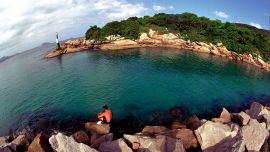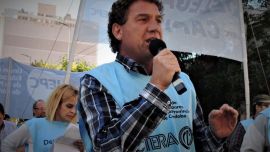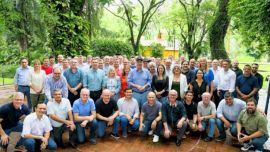Cristina Fernández de Kirchner’s Cabinet allies rushed to her defence on Thursday as they rejected the grounds for her recent corruption conviction and accused the courts of attempting to “ban” her from running from office.
The court that sentenced Argentina’s vice-president to six years in prison and disqualified her from holding public office said its decision to convict her of graft offences last December was based on the fact that she had committed an "act of state corruption." The revelation emerged from the grounds of the ruling, which was published on Thursday by Federal Oral Court No. 2.
"We are faced with an act of state corruption that as such undermines the legitimacy of public institutions, undermines society, moral order and justice as well as the integral development of the people," said the court’s judges in a document of more than 1,600 pages published three months after the verdict was issued.
The vice-president did not react immediately, but her conviction generated a wave of repudiation from pro-government leaders. She was expected to respond to the claims at a high-profile event on Friday in Río Negro.
Fernández de Kirchner was found guilty last December 6 of "fraudulent administration" in the awarding of tenders for roadworks in the home province of Santa Cruz. The court calculated the financial damage at more than 84 billion pesos (about US$407 million at the current exchange rate).
Rushing to her defence, key Kirchnerite figures in the Cabinet on Thursday came out to slam the court’s ruling, alleging that the former president’s conviction is an attempt to “ban” her from politics.
Many from her wing of the ruling Frente de Todos coalition want her to run for the presidency again in 2023, though she has indicated she will not run for public office.
Justice & Human Rights Minister Martin Soria rejected the allegation that there had been misappropriation of public funds, dismissing the court’s ruling as biased against her.
"The objective was, is and will be to prohibit her from becoming president of all Argentines again," remarked the official in an outspoken outburst against the courts.
In radio statements, Soria focused on the "contradictions" in the document released this morning by the court, saying the judges came to an "unsustainable verdict" since "they found no evidence of her in the facts."
"The prosecutors, with their three tons of evidence … have not been able to find a single fact that proves the participation of Cristina Fernández de Kirchner,” he declared, adding: “They invent responsibilities that do not exist.”
Interior Minister Eduardo ‘Wado’ de Pedro also voiced his disdain, decrying the judges’ conclusion.
"It is another day of persecution, where the Judiciary is once again demonstrating the role it is playing. Sectors of the Judiciary are fulfilling a disciplinary role, where it seems that they are discerning and working in election years, campaigning and modifying the Electoral Code with the Penal Code," he alleged in radio statements.
The minister admitted that he had not yet managed to complete the reading of the more than 1,600 pages of the ruling, but said he was struck by the fact that "on March 9, like 1956, we are once again entering a period of proscription," a reference to the day a decree was issued outlawing Peronism.
Echoing those who say the Judiciary is acting in a politically motivated manner, Public Works Minister Gabriel Katopodis claimed the judges are preventing Argentines from having "the right to think about another model of country."
"There is no doubt that there is another sentence: to bury the 12 years of Néstor [Kirchner] and Cristina's government project and demonise what it symbolises and represents," he said.
While it remains unclear what the reaction will be to her appearance in Río Negro, the vice-president has received support from her backers in recent days. As part of the International Women’s Day, Kirchnerite demonstrators rallied in front of the National Congress dressed in black to demonstrate in her favour.
–– TIMES & agencies



















Comments